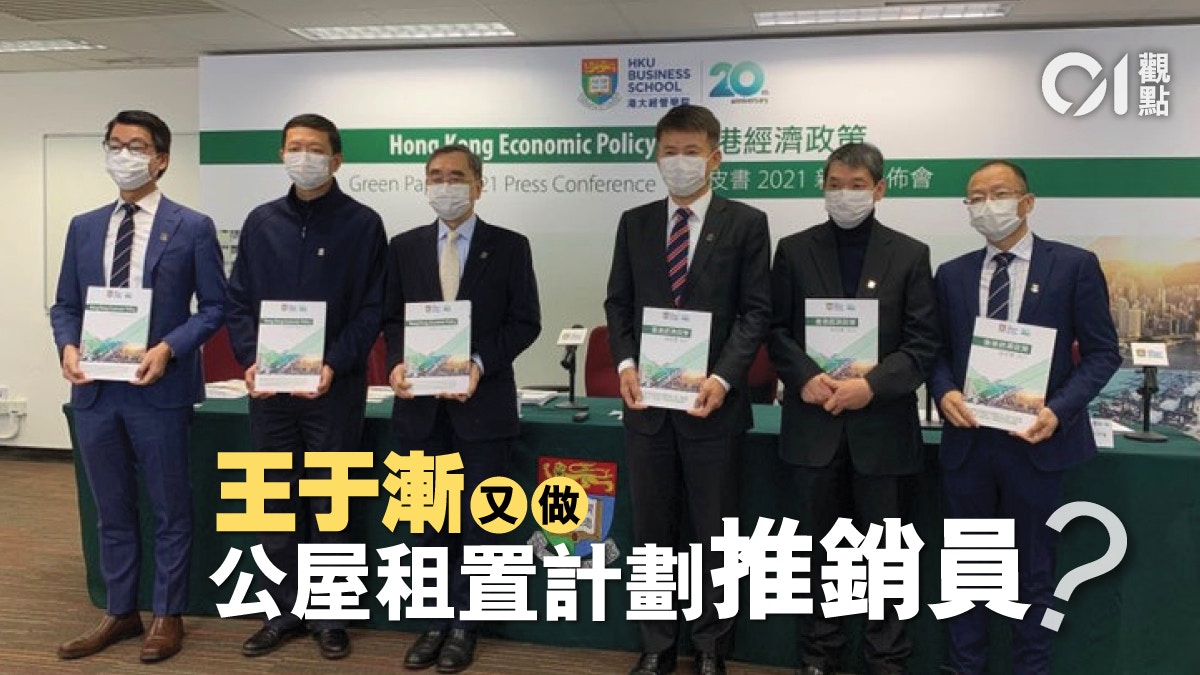01 view
Written by: Commentary Editing Room
2021-01-18 16:15
Last update date: 2021-01-18 16:16
The School of Economics and Management of the University of Hong Kong published the "Green Paper on Hong Kong Economic Policy" last Friday (15th), proposing reform directions on the four major economic areas of Hong Kong's economy, industry, human capital, supervision and regulation, and housing.
The Green Paper proposes to re-introduce the rental purchase plan and the constant property tax to speed up market circulation and curb the rise in property prices, respectively. However, the former will also stimulate speculation, while the latter has not been able to deal with the long-standing demand for home ownership in Hong Kong. Receive the expected effect.
It is not the first time that Hong Kong University’s Chief Vice-President Wang Yujian has acted as a salesman for the TPS.
Last year, at the forum of the United Hong Kong Fund, Wang Yujian suggested that the authorities launch the "Tensing Purchase Scheme 2.0" and pointed out that revitalizing public housing can allow the public to share the newly created wealth and solve social wealth inequality.
However, Professor Wang’s judgment on the property market has always been based on the "efficient market hypothesis" and treats houses as ordinary commodities. However, this not only breaks away from the fact that the market has long been distorted and cannot be automatically corrected, but also violates the mainland’s housing market The main theme of the policy is to live without speculation.
This time, Wang Yujian and other 11 professors jointly compiled the "Hong Kong Economic Policy Green Paper". On housing issues, it is recommended to re-launch the rental purchase plan to connect the public and private housing markets and increase the turnover ratio of public housing.
There are two specific plans: one is to sell public housing to existing tenants at a 25% discount from the market price, while the HOS will remain sold at a 30% discount. If the two types of plans are resold in the corresponding secondary market, no land premium is required; the other is The standardization was changed to exempt 30% of the land price to be paid, so that the unit prices of the two schemes would be sold at approximately 40% and 30% of the market price.
The Green Paper believes that this will help the secondary market and the open market for subsidized housing.
Wang Yujian suggested that the government sell his existing public housing units to existing tenants.
﹙Profile Picture﹚
The tenancy plan will only attract speculation
Although the TPS may increase the turnover in the short-term, its side effects should not be underestimated.
On the surface, this is an attempt to use market forces to reallocate public resources to the most needy social strata. However, the waiting time for public housing in Hong Kong is 5.5 years. The crux of the problem is insufficient supply, so the TPS will only reduce short-term availability. The number of public housing units available for allocation indirectly increases the waiting time.
Moreover, the supply and demand of the housing market in Hong Kong is extremely distorted. Even under the gloom of the epidemic, property prices have not fallen. Once the government reintroduces the rental housing scheme, it will not be able to curb speculation. It will only attract more citizens to participate in speculation in disguise. Sale.
In addition, the Green Paper also proposes to replace the current "hot trick" of the property market with a constant property tax, that is, to increase rates from about 5% to 15% of the rateable value. If the effectiveness is insufficient, it can be increased again.
Cheng Tenghuan, an associate professor of the University of Hong Kong, stated that this tax only targets non-local people's home purchase needs, not for permanent residents of Hong Kong, and pointed out that this can curb the former's home purchase needs.
However, looking at the data on property purchases in recent years, there is really little correlation between the demand for property purchases by non-locals and the upward trend in property prices.
Under the current stamp duty measures, if the buyer of residential property is a company or a non-Hong Kong permanent resident, the relevant transaction is subject to buyer stamp duty and new residential stamp duty.
However, according to information from the Transport and Housing Bureau, the number of transactions requiring buyer stamp duty from January to November last year accounted for only 3.3% of the total number of residential property transactions, and in the statistics of first-time home buyers applying for the insurance plan, More than 99% of the approved applicants are Hong Kong residents. It can be seen that the hot atmosphere in the property market in recent years is mostly due to long-standing demand for home ownership, rather than non-locals coming to Hong Kong to speculate.
Furthermore, as early as 2017, after the government spurred the property market's "hot tricks", Financial Secretary Chen Maobo also stated that the proportion of non-local residents buying properties in Hong Kong was not high and remained at about 1%.
Therefore, the property tax proposed in the Green Paper undoubtedly misjudged the cause of the high housing market.
After all, the housing problem in Hong Kong has to be solved by increasing supply. Before this, the Hong Kong Government must also bear in mind to determine the policy positioning of subsidized housing.
Regardless of whether it is public housing or home ownership, the core concept is to provide affordable housing options other than private housing to people with less financial means. The intention is to protect the basic housing rights of the lower class of society, not Let the public regard it as an investment tool for asset appreciation and resale for profit. Therefore, what the Green Paper recommends is to repackage the basic needs of the public as merchandise for resale. This will not only make it difficult to reverse the upward trend of the property market, but it will also provide subsidies Housing is even more divorced from the burden and purchasing power of citizens. Therefore, the Green Paper's housing proposal misjudged the driving force of the housing market's upward trend, and it is also a new bottle of old wine that wants to use market forces to solve market problems.
Does the government have the courage to promote housing reform?
|Yu Pinhai
Does the tenancy plan create wealth or create property slaves?
Be wary of the fallacy of relaunching the tenancy plan
01 view
Public Housing Public Housing Policy HOS Stamp Duty 01 Viewpoint






